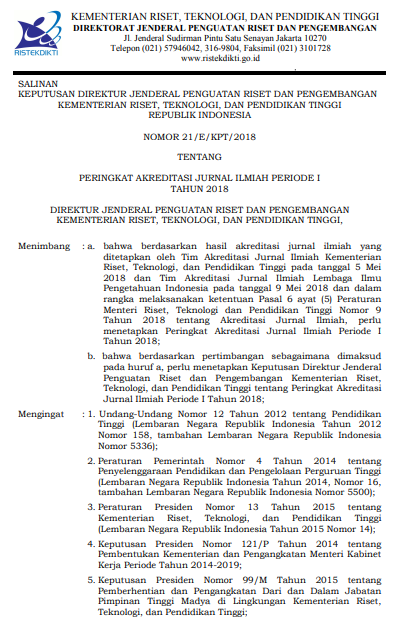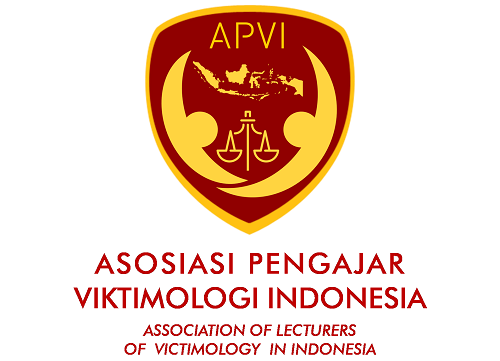Proving The Insanity Defense in The Enforcement of Criminal Law in Indonesia
Abstract
Criminal liability is a manifestation of the perpetrator for his or her crime. Article 44 (1) of the Indonesian Criminal Code (KUHP) explains that the insanity defense may release a perpetrator from conviction. For this research, the utilized research method was normative legal research, by which legal regulations are examined and the results neither reject nor accept a hypothesis, but give prescriptions for what should be proposed. The results of this research showed that first, insanity defense can release a criminal offender from conviction. This is because the perpetrator is unable to consciously understand that his or her actions are against the law, and that person cannot be held with criminal liability. Second, the construction of a verdict to declare whether or not a person qualifies for the insanity defense must be made in advance of his or her psychological condition, to decide if it is appropriate for the perpetrator to be convicted.
Keywords: Proving; Insanity Defense; Enforcment of Crimina Law.
Full Text:
PDF View
References
Allen, Michael J. (1991). Criminal Law. Blackstone press. London.
Aminullah, Sakti. (2018). Asas Strict Liability dalam Tindak Pidana Narkotika [The Principle of Strict Liability in Narcotics Crimes]. Juris-Diction. 1(2). 723-737.
Chan, Winnie and A.P. Simester. (2011). Four Functions of Mens Rea. Cambridge Law Journal. 70(2). 381-396.
Costanzo, Mark. Aplikasi Psikologi Dalam Sistem Hukum [Applications of Psychology in the Legal System]. Yogyakarta: Pustaka Pelajar. 167.
Figinski, M. Albert. (1962). Commitment after Acquittal on Grounds of Insanity, Maryland Law Review. 22(4). 3. 293-330.
Goldstein, Joseph and Jay Katz. (1963). “Abolish the "Insanity Defense"-Why Not?” The Yale Law Journal. 72(5). 853-1092.
Guide to Mental Illness and Criminal Justice System, accessed on May 6, 2020
Hanafi. (1999). Reformasi Sistem Pertanggungjawaban Pidana [Reform of the Criminal Liability System]. Jurnal Hukum. 6(11). 26-43.
Hidayat. (2017). Pertanggungjawaban Pidana Pelaku Tindak Pidana Suap Dalam Tindak Pidana Korupsi [Criminal Liability of Criminal Acts of Bribery within the Criminal Act of Corruption]. Jurnal EduTech. 3(2). 41-53.
Intan, Narindri. (2019). Tindakan Perawat Dalam Keadaan Keterbatasan Tertentu Sebagai Alasan Penghapus Pidana [Actions of Nurses in Certain Limiting Circumstances as Reasons for Acquittal]. Jurist-Diction. 2(1). 237-255.
Kennedy, J. (2006). Dissenting Clark v. Arizona, 548 U.S. 735. 735, 800. 1-22.
Lumencandela, The Insanity Defence. Web site. https://courses.lumenlearning.com/suny-criminallaw/chapter/6-1-the-insanity-defense/ , accessed on May 6, 2020.
M. Abdul Kholiq. (2000). “Buku Pedoman Kuliah Hukum, Fakultas Hukum Universitas Islam Indonesia [Guidebook for Law Studies, Faculty of Law, Islam University of Indonesia]”. Yogyakarta. 129.
Mamangkey, Vallen Andreas. (2020). Tinjauan Yuridis Terhadap Pelaku Dan Korban Prostitusi Online Berdasarkan Kuhpidana Dan Undang-Undang Nomor 19 Tahun 2016 Tentang ITE [Juridical Overview of Perpetrators and Victims of Online Prostitution Based on the Criminal Code and Law Number 19 of 2016 on Electronic Transactions and Information]. Jurnal Lex Crimen. 9(2). 17-27.
Marselino, Rendy. (2020). Pembelaan Terpaksa yang Melampaui Batas (Noodweer Exces) Pada Pasal 49 Ayat (2) [Forced Excessive Defense (Noodweer Exces) for Article 49 Paragraph (2)]. Jurnal Juris-Diction. 3(2). 633-647.
Math, Suresh Bada. Channaveerachari Naveen Kumar, and Sydney Moirangthem. (2015). Insanity Defense: Past, Present, and Future. Indian Journal of Psychological Medicine. 37(4). 381-387.
Moha, Harly Said. (2018). Hapusnya Hak Untuk Melaksanakan Hukuman Karena Terdakwa Meninggal Dunia Menurut Pasal 83 Kitab Undang-Undang Hukum Pidana [Loss of Right to Carry Out Punishment Due to the Death of the Defendant According to Article 83 of the Criminal Code]. Jurnal Lex Privatum. 6(4). 148-155.
Morse, Stephen J. and Bonnie, Richard J. (2013). Abolition of the Insanity Defense Violates Due Process. Faculty Scholarship at Penn Law. 41(4). 488-495.
Mothersole, Brenda & Ann Ridley. (2000). A Level Law in Action. Mcmillan Press. London. 220.
Mousourakis, George. (1998). Justification and Excuse. Tilburg Law Review. 7(1). 35
Muhaling, Aprianto J. (2019) Kelalaian Yang Mengakibatkan Matinya Orang Menurut Perundang – Undangan Yang Berlaku [Negligence That Causes the Death of People According to Applicable Regulations]. Jurnal Lex Crimen. 8(3). 28-38.
Peay, Jill. (2015). Mental Incapacity and Criminal Liability: Redrawing the Fault Lines? International Journal of Law and Psychiatry. 11(1). 25-35.
Purwoleksono, Didik Endro. (2016). Hukum Pidana [Criminal Law]. Airlangga University Press. Surabaya. 98.
Puspitasari, Ida Ayu Indah & Rofikah. (2019) Pertanggungjawaban Pelaku Tindak Pidana Pembunuhan Dengan Mutilasi Yang Mengidap Gangguan Jiwa Skizofrenia [Criminal Liability of a Perpetrator of Murder with Mutilation Who Suffers from Schizophrenia]. Jurnal Recidive. 8(2). 101-110.
Putrawan, Ni Made Raditya Pawani Peraba Sugama Suatra. (2018). Analisis Yuridis Mengenai Kemampuan Pertanggungjawaban Pidana Dalam Pasal 44 KUHP [Juridical Analysis of Criminal Liability Capability in Article 44 of the Criminal Code]. Jurnal Kertha Wicara. 7(4). 1-13.
R, Suhariyono A. (2009). Penentuan Sanksi Pidana dalam Suatu Undang-Undang [Determining Criminal Punishment for a Law]. Jurnal Legislasi Indonesia. 6(4). 615-666.
Ramadhanita, Adila & Ida Keumala Jeumpa. (2018). Peranan Keterangan Ahli Kedokteran Jiwa Dalam Perkara Pidana (Suatu Penelitian Di Wilayah Hukum Pengadilan Negeri Banda Aceh) [The Role of Testimony by a Psychiatrist in a Crime (A Research in the Legal Area of the Banda Aceh District Court)]. Jurnal Ilmiah Mahasiswa. 2(1). 1-7.
Raspati, Lucky. (2013). Konsep Ketidakmampuan Bertanggung Jawab Dan Penerapannya Dalam Peradilan Pidana Indonesia [The Concept of Incapability to Be Liable and Its Application in Indonesian Criminal Trials]. Jurnal Kajian DPR-RI. 18(1). 55-79.
Ronald Dworkin in Anita Allen, L. (2010). Mental Disorders and The “System Of Judgmental Responsibility”. Boston University Law Review. 90(621). 621-640.
Sanita, Aidina Nur & Widodo Tresno Novianto. (2018). Analisis Pemidanaan Dalam Tindak Pidana Aborsi Yang Dilakukan Oleh Dokter (Studi Putusan Nomor: 536/Pid.Sus/2013/Pn.Srg) [Analysis of Conviction in an Abortion Crime Committed by a Doctor (A Study of Verdict Number 536/Pid.Sus/2013/Pn.Srg)]. Junal Recidive. 7(1). 98-107.
Saputra, Rony. (2015). Pertanggungjawaban Pidana Korporasi Dalam Tindak Pidana Korupsi [Corporate Liability in the Crime of Corruption] (Bentuk Tindak Pidana Korupsi Yang Merugikan Keuangan Negara Terkait Pasal 2 Ayat (1) UU PTPK). Jurnal Cita Hukum. 3(2). 269-288.
Schultz, D.P. & S.E Schultz. (2011). A History of Modern Psychology. Tenth Edition. Belmont CA: Wadsworth h. 11.
Suemnick, David A. (1963). Insanity as a Defense and the Problem of Definition. Marquette Law Review. 46(13). 542-548.
The Crown Prosecution Service. (2019). Mental Health: Suspects and Defendants with Mental Health Conditions or Disorders. https://www.cps.gov.uk/legal-guidance/mental-health-suspects-and-defendants-mental-health-conditions-or-disorders, accessed on May 6, 2020.
Tillim, Sidney J. (1951). Mental Disorder and Criminal Responsibility. Journal Criminal Law & Criminology. 41(5). 4. 600-608.
Tribowo Tuahta Ginting, Klasifikasi Gangguan Jiwa Menurut PPDGJ III [Classification of Mental Disorders According to PPDGJ III], presentation slides. Source: https://www.scribd.com/doc/28554403/Klasifikasi-Gangguan-Jiwa-Menurut-PPDGJ-III, accessed on May 12, 2020.
DOI: http://dx.doi.org/10.20884/1.jdh.2019.19.3.2739
Refbacks
- There are currently no refbacks.
JURNAL DINAMIKA HUKUM Indexed by :
 | Jurnal Dinamika Hukum | |
| Faculty of Law, Universitas Jenderal Soedirman | Copyright of Jurnal Dinamika Hukum | |
| Yustisia IV Building, Law Journal Center | ISSN 2407-6562 (Online) ISSN 1410-0797 (Print) | |
| Purwokerto, Central Java, Indonesia, 53122 | JDH is licensed under a Creative Commons Attribution 4.0 International License | |






